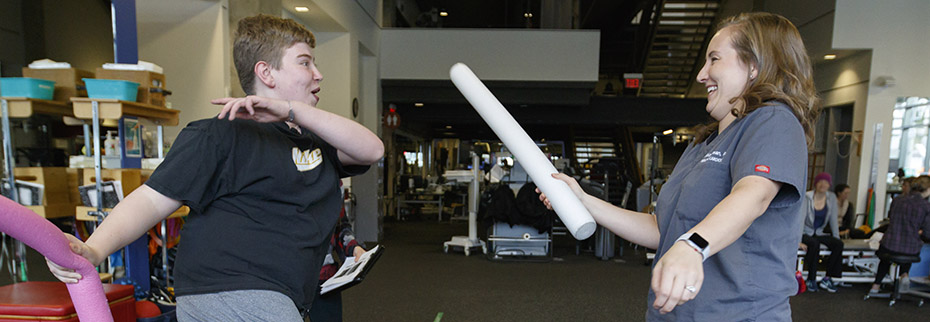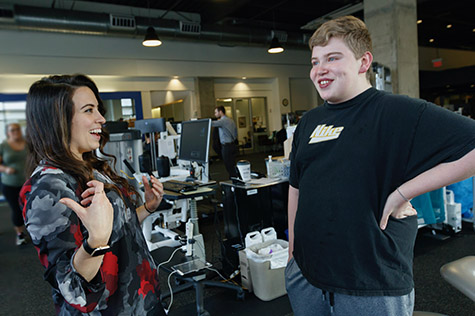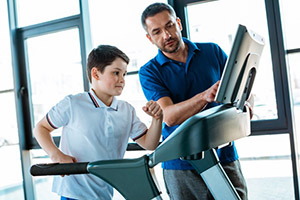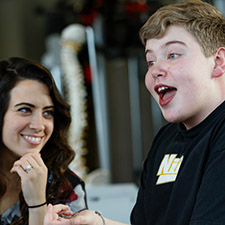Pediatric Heart Rehabilitation

We understand that your child wants to be as active as possible. OHSU Doernbecher Children’s Hospital offers the only children’s heart rehabilitation program in the Northwest. We help children and teens with heart conditions build the confidence and strength to hike, play sports or keep up with friends on the playground.
You’ll find:
- Supervision of your child’s program by a cardiologist or advanced practice provider (such as a physician associate) to ensure your child’s safety.
- One-on-one training with an experienced children’s physical therapist.
- Individual goals and home fitness plans.
- Exercise stress tests before starting out so you know the right and safe level of exertion for your child.
- Fun games and activities in our children’s physical therapy rooms.
Heart rehabilitation for children
What is heart rehab?
You may be surprised by how much your child can do with the right support and structure. Our program encourages children and teens with heart defects and disorders to become active in a safe, supervised and fun way.
Your child’s rehab team will include a children’s cardiologist, physician associate and physical therapist. They will work with you to assess your child’s fitness level, and to set and achieve goals.
Over 12 weeks, your child will develop stamina and strength in one-on-one training sessions with a physical therapist and through physical activities at home.

cardiac rehab program. “Consistent exercise habits are
ideal for heart health,” she says.
Why is heart rehab important?
Young people with serious heart conditions often avoid exercise because they or their parents aren’t sure their hearts can handle it. They can become sedentary, which leads to weaker muscles, lower stamina and negative effects on long-term health.
Advances in heart care — including new surgical techniques, medications and other treatments — allow more children with a heart condition to exercise safely.
A structured rehab program can help children:
- Improve health and quality of life.
- Recover faster from surgery and other heart treatments.
- Gain confidence in their body’s ability to work hard.
- Participate in sports, physical education and activities with friends.
Exercise alone can’t fix your child’s heart condition. But it can help the heart and lungs work more efficiently.
Is heart rehab safe?
We have experience working with children and teens who have the most severe and complex heart problems, including single ventricle heart disease and cardiomyopathy. Some children are recovering from surgery, and others want to improve what they can do each day.
A doctor will supervise each step of rehabilitation to make sure it’s safe for your child’s heart condition and fitness level. We start with an exercise stress test to check how well your child’s heart and lungs work during exercise. Results help us create a rehab plan that is right for your child’s needs and goals.

tests to create custom exercise plans. Patients build stamina in a way that’s
safe for their hearts.
Our services

Setting goals: We first gather information to get an overview of your child’s quality of life. We’ll ask what your child can do and what your child would like to do. Then we’ll tailor a rehab plan to meet those goals. For instance, if your child wants to hike, we’ll focus on leg strength and endurance.
Exercise stress test: Under a doctor’s supervision, your child will exercise on a stationary bike or treadmill while attached to heart and lung monitors. An arm cuff, electrical sensors and mouthpiece will measure breathing, heart rhythm and blood pressure. We will slowly increase the difficulty for about 10 to 12 minutes until your child is working as hard as possible. The test reassures us that your child’s heart and lungs work fine even during peak exertion. The results are used to guide the rehab plan.
One-on-one training: Our skilled physical therapists specialize in working with children. They know how to make exercise fun. Your child will train with a therapist two days a week for 12 weeks in one of our two rehab centers. The physical therapist will change the activities each time and gear them to your child’s interests, abilities and goals.
Locations
Children younger than 10 train in our children’s rehab center on the seventh floor of Doernbecher Children’s Hospital. The rehab room is full of colorful mats, balls, toys, small bicycles and tricycles. It’s designed for children to feel like they are playing, not working.
Children 10 and older work out in OHSU’s 14,000-square-foot rehabilitation center on the South Waterfront. Children and teens do circuit-based activities such as using stationary bikes and treadmills, doing ladder drills on the floor, and using resistance bands.
Home fitness: Your child will train at home three days a week using a structured fitness plan. After the rehab program ends, we’ll help your child find ways to keep up the progress at home and school.
Locations
Parking is free for patients and their visitors.
Doernbecher Children’s Hospital, seventh floor
700 S.W. Campus Drive
Portland, OR 97239
Map and directions
Center for Health & Healing Building 1, first floor
3303 S.W. Bond Ave.
Portland, OR 97239
Map and directions
Refer a patient
- Refer your patient to OHSU Doernbecher.
- Call 503-346-0644 to seek provider-to-provider advice.
Will’s rehab story

Meet 15-year-old Will Van Dyke, the first patient to boost his fitness — and his confidence — in our children’s heart rehab program.